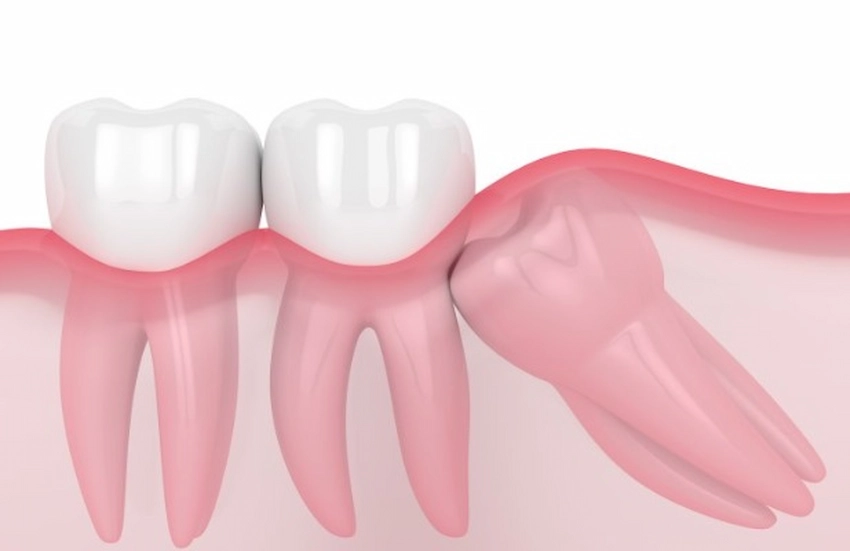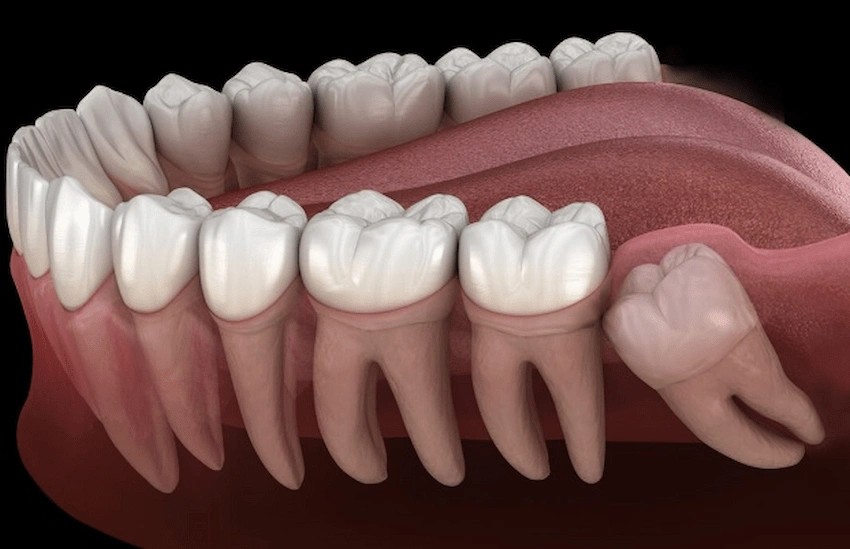🦷How to Relieve Wisdom Tooth Pain?

Dealing with the discomfort that comes with having a wisdom tooth can, as it were, be quite an ordeal but thankfully there are various ways in order to deal with the issue. It’s the first step to understand where the pain is coming from really. You can try some home remedies like a warm mouth rinse with salt water and chewing some aspirin or taking ibuprofen which may ease the pain for a while. Nevertheless, should it happen that you do not find any improvement and the discomfort persists do not hesitate to call the dentist right away since only he can choose the most efficient treatment for this case. He may suggest a root canal, a tooth extraction, or antibiotics depending on your situation.
Understanding Wisdom Tooth Pain
The rising discomfort at the back of the mouth that is referred to as wisdom tooth pain is associated with the eruption of impacted wisdom teeth perhaps due to little room left by the jawbone for proper positioning. When these third molars wrongly grow they can pressure the surrounding teeth causing pain. The gums surrounding partially impacted teeth frequently grow sore and irritated leading to feelings of malaise. By understanding the causes of the discomfort, the patient can know how to get the management and pain relief that is most effective and suitable to their case.
Why Do Wisdom Teeth Cause Pain?
The areas of wisdom teeth in human beings cause the potential for pain and pressure among patients since there is always limited space in the mouth. This leads to the impacted teeth because of the lack of enough space in the mouth for the proper alignment of the teeth. As less than normal space wisdom teeth that attempt to be in the mouth are the cause for misalignment of the adjacent teeth and subsequent pain and unpleasant sensation.
Patients who suffer from the problem of partially erupted wisdom teeth also have another significant problem. Patients with wisdom teeth, the disorders of a cough and various other diseases can often occur and frequently cause severe degrees of sensitivity. The treatment for patients with these problems is quite expensive and is based on surgery which is not clear if it will offer a permanent solution.
Typical Signs and Symptoms of Irritation stemming from Wisdom Teeth Pain
It is important to note that the irritation arising from the growth of wisdom teeth can exhibit a set of common indicators, which could be an indication that one requires professional dental care or medical intervention. The early identification of these indicators is likely to make the process of coping with wisdom tooth irritation and enhance the overall dental hygiene of an individual.
Pain in your jaw regions: This can be described as the experience of mild or intense feeling of pain around the jaw however, it presents as occasionally you could feel this while opening your mouth to carry out any task. The pain could also extend to areas around the neck and the head with possible headache as an added discomfort. You may notice that the pain becomes worse during particular actions such as chewing or yawning.
Inflamed Gum Tissues: The gingival tissue that surrounds the wisdom teeth will mostly identify with an inflammation issue and gingivitis in general, the tissues become reddish and extremely sensitive as a result these situations create discomfort in eating, it might be right now that the central bracket is surrounded by more than one wisdom tooth in the lower or upper jaw because fast-food restaurants and junk food are part of the modern world where we live in.
When Should You Be Worried About Wisdom Tooth Pain?
There are a number of reasons to worry about the pain caused by your wisdom teeth, especially when it starts to become unbearable swelling fever difficulty in swallowing and inability to maintain a well-structured conversation. Persistent and unmanageable pain in your wisdom teeth that does not respond to home remedies should definitely prompt you to go to the dentist without thinking twice. Other things would include the presence of pus, a persistent foul smell in the mouth, or bad breath. These symptoms may also suggest that there is an infection or other dental complication and thereby makes it imperative that the patient seeks the help of a dentist as an emergency patient.
Home Remedies for Wisdom Tooth Pain Relief

People don’t have to endure wisdom tooth pain just because they can’t or won’t visit a dentist soon, and several home remedies offer a great and immediate solution to such a degree of discomfort. The pain from wisdom teeth can really be excruciating, but there are practical, simple, manageable, and safe home remedies to tackle the situation that will greatly relieve the pain and discomfort associated with it thus conveying the awful condition of the wisdom teeth.
Saltwater rinses: Gargling with warm saltwater helps reduce inflammation and cleanse the affected area. It is recommended to take at least half a cup, and its strength should be as such that it is tolerable. It is good to gargle such salty water for a maximum of 30 seconds, but care should be taken so as not to swallow the salty water with its very high concentration.
Cold compress: Applying a cold compress to the outside of your cheek can numb the pain and reduce swelling. Since the wisdom teeth are far back in the mouth, they are somewhat difficult to reach. Use these remedies to relieve the pain until such a time when you will see a dentist. You can apply the cold compress for a maximum of 20 minutes some in an hour in, say for three continuous days. If you are sensitive to ice or cold, you can wrap an ice pack in a clean towel.
Salt Water Rinse to Reduce Inflammation
Salt water rinse is a common home remedy to help relieve the pain caused by wisdom teeth. To make this remedy, it requires putting a spoonful of salt in a cup of warm water to dissolve it well. Rinsing your mouth with this solution can be used to clean your mouth, reduce inflammation and promote healing. It is to be ensured that the solution is tolerable since it should not be too hot or too cold, avoid swallowing the solution because it can be harmful in such a highly concentrated state. Repeat this process for at least three times a day for maximum effectiveness. This rinse is an easy action that can lead to great outcomes in reducing wisdom tooth pain and discomfort and enhances healing and development.
Applying Cold Compress for Numbing Effect
Applying an external cold compress is a good method that helps numb the painful area that is caused by the wisdom teeth. Use a clean cloth to wrap some ice and place it externally on the cheek or jaw directly opposite the aching tooth. By keeping the ice pack on for 15-20 minutes and afterward, stopping again, in case it is not too good, it is probable to be applied and remove and after that apply this again for at least some one hour.
Clove Oil as a Natural Pain Reliever
Clove oil is an extremely popular and well-known spice and a home remedy that has been scientifically validated for its characteristic quality of anti-inflammatory in the capability as a natural pain reliever, and can help in removing the pain in small amounts. Clove oil should be applied carefully to the area around the affected tooth, preferably using a clean and sanitary cotton bud. The eugenol in clove oil is what gives this oil its main effect and can kill pain almost instantly, as if the inhalation of clove itself gives the instant effect of an anesthetic. Another method for the use of clove oil is to dip cotton balls in clove oil and then apply them to the area surrounding the area of affected area.
Over-the-Counter Pain Medications
Over-the-counter pain medications such as ibuprofen or acetaminophen are effective in relieving the discomfort emanating from the wisdom tooth. The effect of these medications is not only to reduce pain but also to help the ailing patient cool the heat and swelling in the area that has the impacted tooth. For maximum benefit of these medicines, adhere to the usual dose of these drugs and seek the advice of qualified personnel if there are any concerning issues regarding the use of any of the medications in treating a specific situation of a person. Thus, the medications work effectively when it comes to offering rapid relief from painful discomforts associated with wisdom teeth.
Herbal Teas and Anti-Inflammatory Foods
Herbal teas can give a soothing effect that is beyond the benefits of the standard teas and they are capable of reducing the swellings and pains that come with wisdom teeth. Chamomile and peppermint teas are another great example, as they also contain anti-inflammatory properties and can effectively help in decreasing pain and swelling in the gum. These herbal teas, together with the other foods that are also anti-inflammatory, thus, will help you eat them and heal your mouth and body at this difficult time.
Professional Treatment Options for Wisdom Tooth Pain
There are some times when home remedies are not enough to relieve pain from wisdom teeth, and these are situations where professional treatment options are suggested. It is crucial to see your dentist, as they are the ones who conduct proper treatment processes by diagnosing the cause of tooth pain and later coming up with the appropriate ways to cure it. Professional treatment options for toothache management can be very diverse and may include, amongst others strong painkiller prescriptions for pain removal in the short term until the complete recovery of the patient, resorting to the invasive procedures of extraction, inflammation, or blockage to treat the root of the problem.
When to See a Dentist?
If the pain coming from wisdom teeth stays for a long time, several days, for instance, it is advised you see a dentist for a diagnosis. It would be a great idea if you also verify the contained symptoms with a dentist e.g. severe pain in the tooth area, unusual swelling of the affected area, fever, malaise or difficulty in opening your mouth. In such a scenario, a timely visit to the dentist will serve you better, as it will help you prevent the development of worse dental conditions and you will be able to manage the inflamed state by resuming the normal functions of the mouth through the timely therapeutic process.
Wisdom Tooth Extraction: What to Expect
Many people will feel uneasy and concerned when they are first told they need to get their wisdom teeth extracted. However, taking the right steps and gathering enough information can reduce the fear of the process. Before the surgery, you will be the first one to talk to the dentist about the necessity to remove this tooth. A local anesthetic will be applied to your mouth afterwards to numb the area and to ensure you do not feel any pain. The operation called wisdom teeth extraction lies in the surgical removal of the tooth, which can be done in about fifteen to thirty minutes at most.
It is a day procedure, meaning that the surgeon will perform the operation and the patient can leave immediately without any adverse effects, without feeling drunk or sleepy. Following the surgery, the dentist will provide a list of care instructions that are to be fully followed to aid the healing of the area and to avoid complications in terms of health. If you are recommended for laser treatment, it is advisable that you hold some sort of conversation with your orthodontist. You can do some preliminary research on these alternative methods of transferring the dental burden to the dental specialist.
Alternative Dental Treatments for Pain Relief
There are a lot of other ways that dentists could recommend to you, such as attending of acupuncture sessions, besides the laser treatment for your pain relief needs. These sessions and a plethora of other techniques have registered significant success among the dental community in the past years and may prove to be less invasive than the surgical procedure.
Patients can get the relief that they desire, while at the same time, these treatments offer pain relief that is allowable for the largest number of patients. In this case, the well-informed patient is the one who is given such an option and then makes the choice of carrying out the preliminary steps of research and consulting with the specialist. Besides pain relief, what other significant roles do the conclusions of the research play?
Signs That One Needs Wisdom Tooth Removal

Although the removal of wisdom teeth is a common dental procedure, medical journals and published books are still not able to cover everything there is to educate the patients to answer the question of whether they need the surgery. Some of the most common signs found within the procedure are described as follows: pain or tenderness- a part of the gum which is painful or tender would give an indication that the tooth is the cause of the problem. The tooth could become a source of persistent aching, excruciating pain, or even resistant to treatment by the dentist. Any of these cases should come to a dentist in your city who can perform the necessary check-up or extraction. At the same time, a swelling and an infection in the affected area are also the major signals that must take the top priority.
Persistent Pain and Swelling
Continuous ache and swelling around a wisdom tooth is often a sign that the tooth should be removed or it would have been better if the teeth were taken out using the procedure for the patient. There are cases where just a little swelling or discomfort occurs after the implementation of a treatment course. However, if the plight of a person is withstanding months of pain and swelling or if the symptoms are getting worse, then it is apparent that there is an infection that requires attention and that a dentist is expected to recommend accordingly. Therefore, having your dentist check the wisdom tooth or teeth and receiving the corresponding treatment route or the surgical removal of teeth that may be imperative for dental health would be ideal.
Infection and Gum Disease Risk
Infection and gum disease risk is perpetually high among patients who have partially erupted wisdom teeth. The contact of the partially erupted wisdom teeth with the jaws and the molar’s large area of the oral region makes the sampling of the former’s content for laboratory tests feasible. Due to the wisdom teeth tough oral positioning and very long distances from the back of the mouth to easy reach and clean, the area between teeth and gums could be a place prone to the settlement of edible particles and bacteria leading to painful infections, the state of which would also mean the contamination of the gums.
Signs such as gum redness, swelling, and pus discharge, and a bad breath smell are an immediate indication to communicate with your dentist, to eradicate the infection, and to set up a discussion on your part that should be about dealing with your wisdom tooth and general health issues accordingly. Adopting this step is not only a preemptive approach for a patient dealing with a major health problem, but it is equally a move to prevent any other forms of disease an individual might contract for themselves, thereby improving their overall health.
How Can You Limit The Pain That Comes From a Wisdom Tooth, and The Situation Does not worsen?
Some measures can be taken to stop wisdom tooth pain from becoming more severe and these are good oral health habits; for example, one needs to conduct daily activities such as brushing and flossing to maintain gum health; moreover, it is essential to keep away from difficult-to-chew foods that are also sticky enough to stick and cause pain or to worsen the case. By being preventive in those two things and following these non-medication options, you could prevent any more issues from getting worse and keep your teeth in a good condition as well as the prevention of wisdom teeth pain from progressing further.
Healthy Lifestyle
It is the most important factor that you have to do to avoid bad things that may occur if you have third molars. You should not forget to have your toothbrush and toothpaste and use it more than twice, and take care of your teeth to get the best results in keeping up with a healthy lifestyle. Food particles and dental plaque, when removed consistently, leave no room for bacteria to cause diseases. Besides, tartar is the cause of the plaque’s tight grip on the teeth, so getting rid of plaque lessens tartar. Also, you can use the mouthwash of the antibacterial type, and as a result, make bacteria disappear, and keep your teeth clean without infections. The only way your teeth will have a clean and healthy atmosphere is if your mouth is free from germs.
is essential to follow the best dental hygiene for you to keep those bothersome third molars from causing unbearable pain.It is essential to clean the teeth more than twice a day with good toothpaste to consistently rid the teeth of food particles and plaque, and by so doing, avoid gum diseases, which may cause some kind of discomfort with the wisdom teeth.
You should also utilize the dental floss that easily penetrates between the teeth to remove any strands of food that may be present. Mouthwashes have the power to reach the areas that are not easily accessed by the toothbrush; therefore, they can help to remove any food remaining and, at the same time, prevent the teeth from bacterial infection. A person who is clean around the wisdom tooth is less likely to be attacked by diseases in the area.
Avoiding Certain Foods That Trigger Pain
Sometimes, it might be a bit of a challenge to avoid certain foods of a certain texture that some of you may find too hard to bite, especially when one is in the throes of wisdom tooth problems. Do not make the mistake of going for those snacks which are both hard and crunchy at the same time as you may later be left with one touch of an opening hole without a tooth in your gum (from hard tacos through to chips.
Also, it would be similarly critical to avoid lollipops, gums, dry fruits, and sticky food items that one takes, in that they have already had in their possession the substances which may be the basis for agitation and are now delivering the same. For this reason, it is always best to maintain the status of your oral cavity in such a way that it stays healthy and clean, free from any possible trouble that may result from specific types of food and the like, which can cause pain.
Sleeping Position and Its Impact on Pain
Significantly, the sleeping position contributes greatly to the pain that erupts from the eruption of wisdom teeth, even as the position taken at the time of sleeping may manifest itself as the cause of the entire problem.One way to do this is to ensure that you lay on your back thus having the extra headrest to get your head in the air which enhances the depth of your sleep.
In addition, this kind of posture prevents negative pressure, which is responsible for inflammation or obstruction-induced pain, it is conducive to good health because it allows the body to relax at the time of sleep. Moreover, it is of great importance to stress the fact that your sleeping position can have a significant impact if a person is still getting recovery symptoms after the extraction of wisdom teeth as mentioned earlier.If we make our decisions regarding sleep with the aim of recovery, we might have the opportunity to eliminate the wisdom tooth pain sources that we have identified and achieve the expected relief.
Recovery Tips After Wisdom Tooth Extraction
The dental extraction of wisdom teeth is a very common procedure that involves a significant amount of dedicated pre and post-operative care. All the instructions that your dentist gives you have to be strictly followed. The correct intake of analgesics, cold compresses, thorough oral hygiene, and proper nutrition are the things that you should do for ensuring that the healing process gets off to a good start. When following these simple and very valuable guidelines, you will not only reduce the possibility of complications but also get back to your regular life more quickly and safely.
Managing Post-Surgery Pain and Swelling
You not only encounter pain, but your face usually experiences swelling after a surgical operation for wisdom teeth. You have to deal with both these problems with full consideration. The timings when instructions urge you to take the indicated pain killers or to use medical packs and ice cubes to relieve your trouble have to be strictly adhered to. Hereby, a person can apply an ice pack on his or her cheeks as multiplied as the pain allows him or her, with the effect that swelling will be decreased significantly.
Moreover, while you sleep, your pillows should support your head and maintain an upright position so that you will not feel any additional pain and at the same time, you will be under fast rehabilitation. Patients ought to know that with the right medical support, they will be perfectly fine if they experience the very minimum pain and swelling during recovery.
What to Eat After Wisdom Tooth Removal?
To mention, the soft diets consumed after wisdom tooth removal will bring you a quick recovery and give you less of a burden. Yogurt, applesauce, and mashed potatoes are only a few examples of soft foods that are easily digested and cause less pain, as they do not need much or any chewing. On the condition that the wound is not fully healed yet, hot and spicy meals should not be eaten, nor the hard ones, since they have the possibility to damage the tender tissue that is in the process of healing. At the required time that you decide that you are now fit to change your diet, you should progressively start it off with items that are relatively easy to manage by your mouth.
How Long Does It Take to Heal?
Recovery times after the removal of one or more wisdom teeth can differ greatly from one person to another. Usually, for most cases, it is three to four days that is spoken of as the immediate recovery window. However, full recovery might go all the way even longer; say it is even 4 weeks in some extreme cases of tissue damage during the procedure, in general, and/or some trouble with the patient. A good number of things, such as age, health status, as well as adherence to after-care rules of the patient, figure in the process of making it smooth for it not to be prolonged due to unnecessary obstacles or mismanagement.
FAQs About Wisdom Tooth Pain and Removal
Being sore after doing your wisdom teeth is a common complaint for many people. If you, too, are currently dealing with any sort of discomfort, then this article will help shed light on a number of critical issues surrounding this delicate dental matter. This post looks at common questions that arise about the pain associated with wisdom tooth removal, including its natural progression, duration, surgery, aftercare, and carefully examining possible issues and dangers involved during extraction processes occurring in relation particularly for these teeth must be understood very well before taking any next steps regarding treatment of one’s molars or making an appointment with your dental surgeon to have them removed in case so needed by the doctor or dentist who has been charging or any similar dental professional.
First and foremost, let us focus on some, what appears to be an elementary-level question: whether these pains go away or not. To answer this question, it is apparent that the evaluated severity and the time a patient had suffered from such discomfort play a crucial role. Yet, the general view of the mainstream opinion and adequate dental professionals is that mild pain felt located around these given teeth falls in the category of normal. It is nonetheless important to refer to oneself even in conditions when grappling with increasing levels of pain for prolonged periods as any point could imply an upsurge in complications or infection The patient needs a dental checkup right away, as early as possible.
Can wisdom tooth pain go away on its own? While wisdom tooth pain may temporarily subside, it often returns due to impaction or infection. It’s important to seek dental care to address the underlying issue and prevent further complications.
Wisdom tooth pain typically lasts for a few days to a week, depending on the severity of the issue, such as impaction or infection. If the pain persists longer, it’s crucial to consult a dentist to determine if extraction or other treatments are necessary.
Yes, there are some risks associated with wisdom tooth extraction, including infection, dry socket, and nerve damage. While these risks are relatively rare, they can lead to prolonged pain, swelling, or complications if not properly managed during the recovery process.
To treat wisdom teeth pain, you can use over-the-counter pain relievers like ibuprofen or acetaminophen, apply a cold compress to reduce swelling, and rinse with warm salt water to soothe the gums. If the pain persists or worsens, it’s important to see a dentist to address the underlying issue, such as impaction or infection.
Wisdom tooth pain is often described as a dull ache or sharp throbbing at the back of the mouth, which can radiate to the jaw, ears, or head. It may worsen when chewing, speaking, or applying pressure to the affected area, and can also cause swollen, tender gums or a bad taste in the mouth if there is an infection.
If your wisdom teeth are coming in, it’s important to maintain good oral hygiene by brushing and flossing carefully around the area to prevent infection. You can also use warm salt water rinses to reduce discomfort and swelling, and apply a cold compress to ease any pain.
Ignoring a wisdom tooth can lead to potential problems, such as infection, impaction, tooth decay, or gum disease. It’s important to consult a dentist if you’re experiencing pain or discomfort to prevent more serious complications down the line.
Wisdom teeth typically begin to emerge between the ages of 17 and 25, triggered by genetic factors and the natural growth of the jaw. This process can be influenced by factors such as hormonal changes, jaw development, or space constraints in the mouth, leading to impaction or discomfort in some cases.
Wisdom tooth pain typically lasts for a few days to a week, especially if it’s caused by eruption or minor irritation. However, if the pain persists longer or intensifies, it could indicate impaction or infection, requiring professional dental treatment.
It’s not necessarily bad if you can feel your wisdom teeth coming in, but it can indicate that they are impacted or causing irritation to the gums. If you experience persistent pain, swelling, or difficulty opening your mouth, it’s important to consult a dentist to ensure there are no complications, such as infection or crowding.




